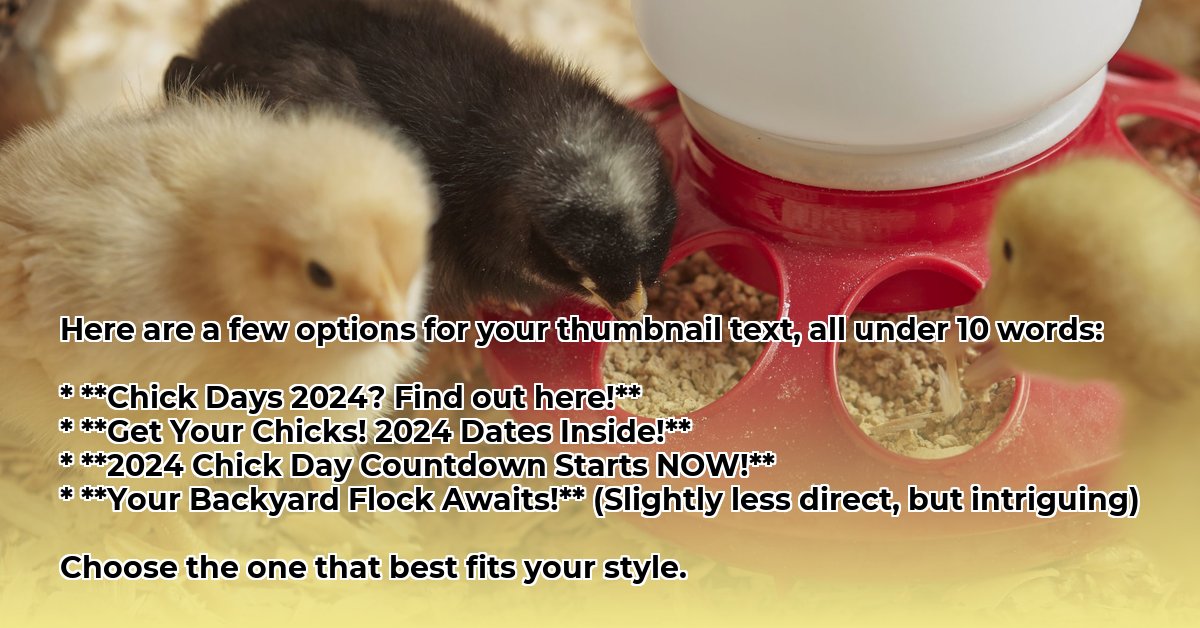
Dreaming of fresh, farm-fresh eggs and the cheerful clucking of your own backyard flock? Tractor Supply's annual Chick Days sale is your golden opportunity to bring home adorable baby chicks! But when exactly does this exciting event take place? Let's get you clucked in! For more information on chicken coops, check out this helpful resource: Tractor Supply Coops.
Cracking the Code: When Do Tractor Supply's Chick Days 2024 Begin?
Pinpointing the precise Chick Days 2024 dates requires a bit of detective work. Tractor Supply typically announces the sale timeframe a few weeks in advance. However, based on previous years, the event usually falls between late March and early May. Keep a sharp eye on the Tractor Supply website and social media pages beginning in early spring. Don't miss out on this exciting event!
Before You Get Your Chicks: Laying the Groundwork for Success
Bringing home baby chicks is thrilling, but preparation is key to a successful and joyful experience. Before those fluffy bundles of joy arrive, let’s ensure you're ready!
1. Building Your Chick Condo: Brooder Setup
Baby chicks need a safe, warm haven – a brooder (a temporary enclosure). This could be a large plastic storage bin or a specialized brooder box. The key is a draft-free, cozy space.
2. Gathering Your Chick Essentials
You’ll need more than cuteness to keep your chicks thriving. Stock up on:
- A heat lamp (to maintain optimal temperature)
- Soft bedding (pine shavings are a popular choice)
- Food and water dishes suitable for tiny beaks
- A thermometer to monitor the brooder temperature
Think of it as setting up a mini-nursery for your newest feathered family members.
3. Choosing the Perfect Poultry: Breed Selection
Research different chicken breeds before Chick Days. Some breeds excel at egg-laying, while others are hardier in certain climates. Consider your space, climate, and desired egg production.
4. Planning Ahead: Adult Housing
Your chicks grow quickly! Plan for their eventual move to a larger coop. Consider size, ventilation, and predator protection when designing or purchasing your coop.
5. Chick Care 101: First Steps
Before your chicks arrive, familiarize yourself with basic chick care. Learn about maintaining appropriate temperature, providing proper nutrition, recognizing signs of illness, and implementing preventative measures. Many excellent online and print resources are available to guide you.
Chick Days: Weighing the Pros and Cons
Like any important decision, let's examine the advantages and potential drawbacks of participating in Tractor Supply's Chick Days.
| Advantages of Chick Days | Potential Drawbacks |
|---|---|
| Convenient access to chicks and essential supplies at competitive prices. | Risk of disease transmission if proper biosecurity measures aren't in place. |
| Affordable prices; often lower than other sources. | Requires a significant time commitment for daily chicken care. |
| Supports local food systems and community engagement. | Possibility of impulse purchases without sufficient forethought. |
| Introduces people to the rewarding experience of backyard poultry keeping. | Requires adequate space and resources; proper planning is key. |
Beyond the Baby Fluff: The Long-Term Commitment
Chick Days are exciting, but remember—those adorable chicks will grow into adult chickens needing ongoing care. They're livestock with specific needs.
- Daily Care: Expect daily coop cleaning, providing fresh food and water, and egg collection.
- Health Monitoring: Regularly check your flock for signs of illness; consult a veterinarian if needed.
- Waste Management: Compost chicken manure responsibly to enrich your garden. A sustainable approach is key to proper waste management.
- Predator Protection: Ensure your coop is secure to protect your flock from predators.
- Ethical Treatment: Always prioritize your chickens' well-being with a focus on providing a nurturing and enriching environment.
How to Ensure Sustainable Backyard Chicken Farming from Tractor Supply Chicks
Key Takeaways:
- Thorough Planning: Research local ordinances, suitable breeds, and needed supplies before Chick Days.
- Chick Health First: Proper brooding, nutrition and strict biosecurity are crucial to raise healthy chicks.
- Long-Term Commitment: Backyard chicken farming requires consistent time, effort, and resources.
- Sustainable Practices: Implement responsible waste management, natural pest control, and ethical care.
- Expect Challenges: Be prepared for potential chick losses; it's part of the process. Have a plan for dealing with illness or predation.
Planning Your Flock: Before the Chicks Arrive
Don't rush into Chick Days! Solid planning is paramount. First, research your local ordinances regarding backyard chickens. Then, consider your space, climate, and desired flock size. Choose chicken breeds suitable for your environment and goals. Finally, create a realistic budget for chicks, housing, feed, and supplies.
Setting Up Your Brooder: A Chick's First Home
A properly set up brooder is your chicks' safe haven. It needs proper heating, ventilation, and clean bedding. A heat lamp is crucial – constantly monitor the temperature. Provide fresh food and clean water daily. Regular cleaning prevents disease.
Choosing Your Chicks: Straight-Run or Pullets?
Tractor Supply offers "straight-run" (mixed sex) and "pullets" (guaranteed females). Pullets are more expensive but eliminate the risk of roosters. Straight-run chicks offer cost savings but can result in unwanted roosters. Check your local ordinances regarding rooster ownership before deciding.
Chick Care 101: Nutrition and Health
Maintain good chick health through daily care. Monitor for signs of illness—lethargy, ruffled feathers, or diarrhea. Provide high-quality chick starter feed and fresh water. Consider supplements under veterinary guidance. Clean the brooder frequently to prevent disease. A gradual transition to adult feed is also important.
Gradual Transition to the Coop: From Brooder to Backyard
After a few weeks, gradually introduce chicks to their coop. Ensure it's secure, well-ventilated, and has roosting bars and nesting boxes.
Sustainable Practices: Beyond the Basics
Sustainable farming focuses on responsible waste management, natural pest control, and enriching your birds' lives. Compost chicken manure. Use natural pest control methods. Provide space for foraging and dust baths. Remember, ethical treatment is paramount to the well-being of your flock. Happy chick-raising!